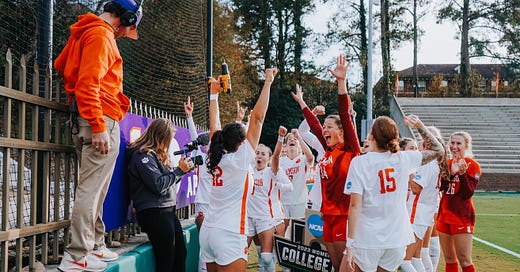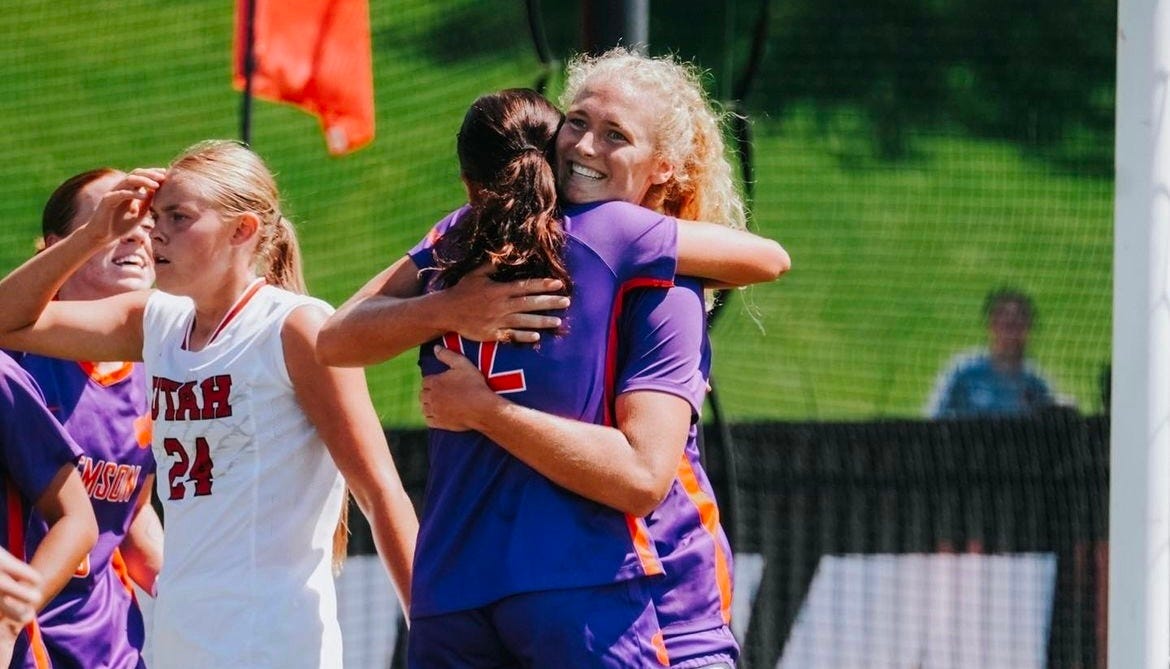The weight room has always been my safe space. Gilded in authenticity, it's a place where talent takes a backseat to effort. I love that I can push myself to both my mental and physical limits in an environment where progress is earned, not gifted. Over the years, I’ve met some of my favorite mentors and leaders inside different weight rooms. And while the facilities at Clemson University are incredible, it's the people inside them that I credit for my greatest strengths. It’s where I learned what it means to be a championship teammate.
With soccer being a fall sport, our team reports back to campus in the summer to start getting ready for the season ahead. These months are all about laying the foundation—physically, mentally, and emotionally. If you aren’t fit, you aren’t prepared. Our fitness isn’t just about running faster or longer in games, it’s crucial for preventing injuries, staying present on the field, and having the stamina to focus on the technical and tactical side of the game.
I lived for those summers. Mornings started with runs, followed by lifts, field work, extra fitness sessions, and genuine quality time with teammates. Since we were among the few students on campus during this time, the place felt like ours. I remember wrapping up those sessions, dripping sweat and tired, thinking: How lucky am I to be living my dream? Of course, these summers weren’t easy. They were tough and exhausting in all the best ways. Dying on the line with your teammates is an indescribable feeling. Especially when you understand the why behind the work.
The summer before my junior year, the director of olympic strength and conditioning at Clemson, Rick Franzblau, introduced us to the idea of being a championship teammate. It was one of those early morning sessions on the dewy grass where we were up before the sun and ran ourselves into the ground. When Rick showed up to a session, you knew you were about to give 110%. He has a motivating presence about him that makes you listen a bit harder and run a bit faster. Rick had seen by the way our team was working that summer that the year was going to be something special. As he brought us in for him to speak, his words offered great wisdom and encouragement.
He reminded us that the preparation we were doing wasn’t just for the start of the season—it was for the entire journey. He acknowledged our extreme work ethic and attitude with a mention of staying humble during the highs and remaining strong willed through the lows of the inevitable roller coaster that the fall season brings. But what he told us about being a championship teammate resonated with me more than anything.
He said:
"Championship teams are made of championship teammates. And being a championship teammate means loving your team more than you love your role."
Rick later told me that he first heard these words from Clemson Baseball Head Coach, Erik Bakich. To me, this exemplified the beautiful thing about leadership—it moves like a ripple.
Leadership is influence, and influence is passed. Great leaders borrow wisdom and share it freely, not to own the moment, but to serve the mission. One phrase, passed from coach to coach, player to player, coach to player, can shape the mindset of an entire team. And when that kind of message sticks, it doesn’t just inspire, it empowers. Leadership is legacy through language. It’s paying attention to what works, and sharing it to make others better.
Those words stuck with us.
That summer, we could tell we had the talent to go far. But talent alone had never been enough. What held us back in years past was a lack of full-team buy-in. Transparently, even from me. But that year, things would be different, the team vowed to hold nothing back. Months later, we made Clemson Women’s Soccer history. We may not have won the national championship, but we won in our own way—and our team was full of championship teammates.
Being a championship teammate means owning and accepting your role. Fully. It’s about showing up every day with the intention to be the absolute best at what your team needs from you, even if that role isn’t the one you dreamed of.
On game day, that might look like starting and performing under pressure. It might mean being the first one off the bench, ready to change the game. Or it could mean sitting on the sideline, bringing energy, support, and unwavering belief in the people beside you.
At practice, it means raising the standard. It’s about making training harder than the game. Pressing quicker, tackling harder, demanding more from yourself and your teammates so when the real whistle blows, you're ready.
Whatever your role, own that shit. Embrace it and be the best at it. Love your team more. Understand that your role has power. It matters and it is necessary.
During the summer, when no official roles had yet been defined, being a championship teammate meant showing up with relentless effort every day. In the weight room and on the field, no one asked who was starting. Everyone was expected to push. If you were the fittest, your job was to lead and pull others along with you. If you weren’t, your job was to catch up.
Once the season began and roles crystallized, the message didn’t change. If we wanted to win, it would take a full team of championship teammates—selfless, hard-working, bought-in people—doing whatever it took to help the group succeed.
It was countless conversations with our personal strength and conditioning coach, Erika Troutman, who also happens to be one of my greatest mentors and friends, that reiterated this message with me for the remainder of my career at Clemson. She extended the championship teammate message by adding that:
“Championship teammates have championship benches.”
The team isn’t just the eleven on the field. It's the subs, the coaches, the injured, the equipment managers, the support staff—everyone on that metaphorical (and literal) bench. Every role fuels the whole. And just like a great teammate needs support, you need people on your bench in life too. People cheering you on, picking you up, reminding you what you’re capable of. Erika is a consistent reminder of the support and energy championship benches bring, and their necessity for success.
I think about Sami Meredith when I think about what it means to be a championship teammate. I got to play with Sami for three amazing years. Sami wore every hat during her time at Clemson—starter, sub, sidelined, injured—and she wore each with purpose and pride. She pushed the fitness standard and mentored younger players with patience and love. No matter where she stood, she was always ready to impact the game, and she was always hungry for more. People like Sami are the reason why teams are successful. She changed the game wherever she was, and provided an impact both tangible and unseen.
Sami showed that you don’t need a title to lead. You don’t need a guaranteed spot to make a guaranteed impact. She taught me that the loudest leaders aren’t always the ones scoring goals or wearing the captain's armband—sometimes, they’re the ones showing up consistently, pushing the pace, and making sure everyone around them knows they matter.
That’s what being a championship teammate is all about. A reminder that success isn’t just about what you accomplish, it’s about how you help others accomplish more. Lifting people up, playing your part without needing applause, and finding pride in the collective.
Looking back, the teams I’ve loved the most, whether we won championships or not, were the ones filled with people like Sami. People who made you want to be better just by the way they carried themselves.
Because at the end of the day, when the wins and losses fade, what you remember are the people. The moments on the line in the heat, the nods of encouragement in the weight room, the way your teammate celebrated your success like it was their own. You remember how it felt to be part of something bigger than yourself, and to know you gave everything you had to it.
Being a championship teammate can be hard—especially when your role isn’t what you hoped for. Maybe you wanted to start, but you're coming off the bench. Maybe you gave everything, and it still wasn’t enough to land the spot you envisioned. That’s tough, and it’s okay to feel that.
But at the end of the day, it’s about looking in the mirror and asking: What does my team need from me right now?
It’s knowing that you can be hungry for more and still grateful for the opportunity. You can feel both frustration and pride. You can want more, and still give everything to the role you have. But you can’t let your team down.
It’s about choosing to show up fully, not just when the spotlight is on you, but especially when it isn’t.
Being a championship teammate is an ode to the selflessness that comes with being part of a team. When you commit to playing at a program, you don’t commit to a set role or expectation of playing time. You are committing to the mission. To a team that needs you, in whatever capacity that may be.
And the beauty of this mindset? It doesn’t end when the game does.
Teams are everywhere. You can be a championship teammate in your office. Bringing optimism to every meeting, staying late to work on a project, or offering a word of advice during trying times. You can be a championship teammate in your family. Showing up when it’s inconvenient, listening without needing to fix, and encouraging your loved ones to fight for what they want. You can be on someone’s bench. Steady, reliable, and full of belief in the people around you. Finding the quiet moments where leadership lives.
You have to love your team more than you love your role.
Being a championship teammate starts long before the lights come on or the scoreboard starts ticking. It’s a mindset rooted in consistency, humility, and an unwavering commitment to the people around you. It’s about showing up and bringing your best regardless of your role. Championship teammates hold themselves and others to a higher standard, not for recognition, but for the success of the collective. They lead with actions, support without ego, and understand that true strength lies in how you serve the team. This standard isn’t limited to sports, it’s a way of operating in every team you’re part of. And the best part? It’s a choice you get to make, every single day.
Be a championship teammate.
MAKE YOUR IMPACT!





I am so very proud of the woman you’ve become!